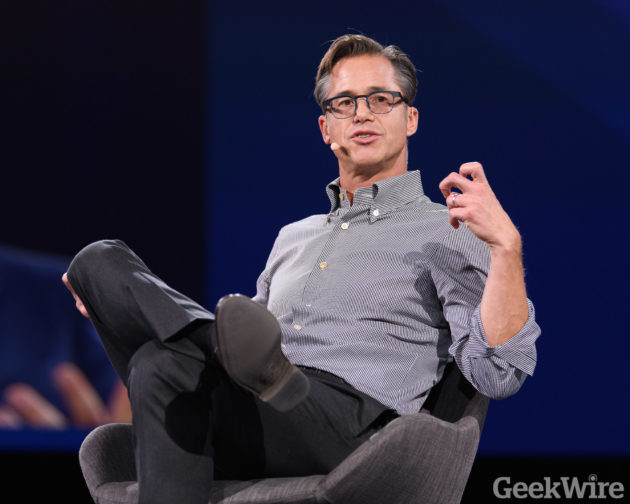
There’s a common thread between Expedia, Zillow, and Glassdoor.
That would be Rich Barton, the Seattle-based entrepreneur who helped start all three companies.
Travel giant Expedia is worth nearly $17 billion. Real estate powerhouse Zillow just reported $299 million in quarterly revenue. And Glassdoor, a recruiting and jobs platform, just announced this week that it will sell for $1.2 billion.
What’s Barton’s secret? Give power to the people, he tells GeekWire.
“If you set information free, and shine a light on important information that was once in the dark, magic can happen,” he said in an email. “People ultimately want to be empowered to make smarter decisions — whether that’s for travel decisions, buying or selling homes, finding jobs, finding an attorney, considering cosmetic treatments … or just about anything else.”

Barton also sits on the board of online legal directory Avvo (acquired by Internet Brands in January) and cosmetic treatment review platform RealSelf (raised $40 million last month), two more companies that share a common trait of providing data to empower decision-making.
The idea for Glassdoor came about more than a decade ago after Barton accidentally printed salary and stock data for every Zillow employee in the middle of the Seattle company’s office, as this New Yorker story recounts. As his assistant scrambled to get the documents before anyone else saw, Barton wondered why that information needed to be private.
He later teamed up with former Expedia colleagues Robert Hohman and Tim Besse to launch Glassdoor, which now has 59 million active monthly users and data on more than 770,000 companies across 190 countries. People use the online tool to search for jobs; look up pay data; read about interview experiences; see office photos; and much more.
Barton, Glassdoor’s chairman, credited Hohman and Besse for the company’s success.
“An idea is only as good as the people who execute against it,” Barton said. “I wouldn’t have bet on Glassdoor without Robert and Tim leading the charge from taking a kernel of an idea to building a global business and sustainable model.”
“While it starts with the team, it also has a powerful mission: to help people find a job and company they love. That has been at the core of the brand, services and even monetization since the beginning.”
Glassdoor, which raised more than $200 million, had reportedly been an IPO candidate. Bloomberg reported that it was growing revenue by 30 percent year-over-year. The company earns revenue in part from employers who pay to leverage premium features of the platform to connect with job candidates.
Glassdoor will keep its brand and operate as a separate part of its acquirer Recruit Holdings, a Tokyo-based HR technology giant.
“We definitely had optionality, which is a valuable position to be in,” Barton said. “We see incredible value in being part of Recruit to help us grow the Glassdoor business and brand even faster than we otherwise could.”
How to conjure up your future: Zillow and Expedia co-founder Rich Barton’s advice to UW computer science grads
Barton, a venture partner at Silicon Valley venture capital firm Benchmark, has long touted the philosophy of “power to the people.” That thesis is ever-present in the origin stories of Glassdoor, Zillow, and Expedia.
“We couldn’t believe how hard it was to access basic, fundamental information about what the address of a house was, what the listings were, how much they were, what the homes looked like on the inside,” Barton said in 2015, recalling how Zillow got its start. “This was in 2004 and the internet had been around for nine years — why couldn’t I access this information? We thought, well, you know what happened in travel with Expedia by giving power to the people, letting them access this huge marketplace of information and take control? We thought that ought’ to happen in real estate, too.”
Former Microsoft CEO Steve Ballmer is following a similar thesis with his new endeavor USAFacts, which is giving U.S. citizens insights into their government by uncovering troves of public data.
“I don’t buy that we’re in a post-fact world,” Ballmer said in an interview with GeekWire last month. “People talk about alternate facts, they talk about fake news … but the numbers are what they are. They tell us about the past. They give us the ability to judge the forecast that we all have for the future.”
Asked about this thesis in regard to the era of President Trump, Twitter, and fake news, Barton said last year that “the upsides of giving power to the people dramatically outweigh the downsides.”
“Giving people voice who didn’t have voice is good,” he said in 2017. “Giving people information who didn’t have information is good. Giving everyone the ability to be a publisher, and not just the elites, is generally very good. Now, are there bad aspects of each one of those things? Absolutely, and we are experiencing some of those right now.”
For those looking to learn anything from Barton’s epic entrepreneurial track record, he provided simple advice.
“Work with great people and don’t be afraid to take big swings,” he said on Wednesday. “Good luck.”


